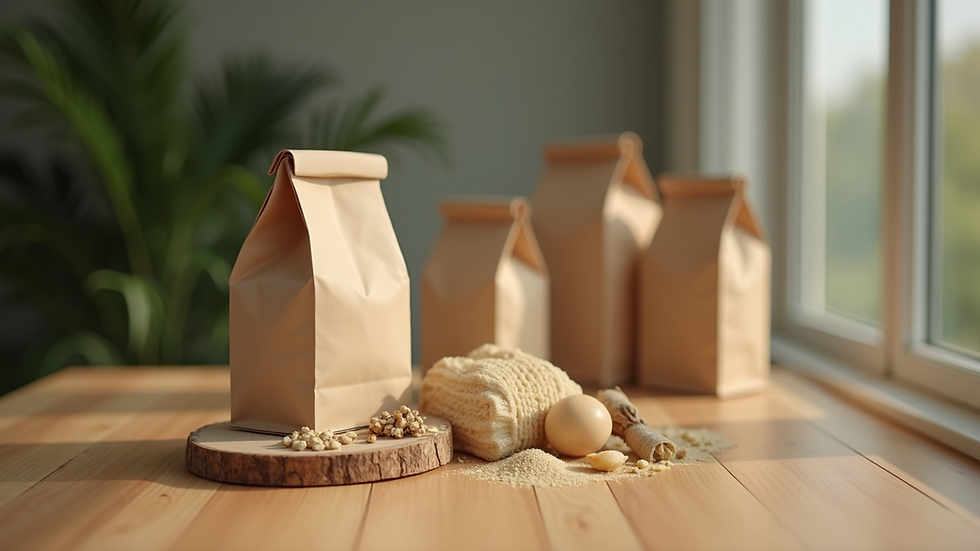Eco-Friendly Packaging Options That Make a Difference
- Tijara Retail
- Aug 30
- 3 min read
In today’s world, sustainability is more than just a buzzword. It’s a necessity. Businesses and consumers alike are seeking ways to reduce their environmental impact. One significant area where change is happening is packaging. Traditional packaging materials often contribute to pollution and waste. Fortunately, there are many green packaging solutions available that help protect the planet while meeting practical needs.

Understanding Green Packaging Solutions
Green packaging solutions refer to packaging methods and materials designed to minimize environmental harm. These solutions focus on reducing waste, using renewable resources, and ensuring materials can be recycled or composted. The goal is to create packaging that supports a circular economy rather than a linear one.
Some common characteristics of green packaging include:
Made from renewable or recycled materials
Biodegradable or compostable
Minimal use of plastics or harmful chemicals
Lightweight to reduce transportation emissions
Designed for reuse or easy recycling
By adopting these solutions, companies can reduce their carbon footprint and appeal to eco-conscious consumers.
Popular Green Packaging Solutions in Use Today
There are several innovative green packaging solutions that businesses are adopting. Here are some of the most effective and widely used options:
1. Biodegradable Plastics
Biodegradable plastics break down naturally in the environment, unlike traditional plastics that can take hundreds of years to decompose. These plastics are often made from plant-based materials like cornstarch or sugarcane.
2. Recycled Paper and Cardboard
Using recycled paper and cardboard reduces the need for virgin materials and saves trees. These materials are also easy to recycle again after use.
3. Mushroom Packaging
Made from agricultural waste and mycelium (the root structure of mushrooms), this packaging is fully compostable and breaks down quickly in soil.
4. Plant-Based Packaging
Materials like bagasse (sugarcane fiber), bamboo, and palm leaves are used to create sturdy, compostable packaging options.
5. Edible Packaging
An emerging trend, edible packaging is made from natural ingredients that can be safely consumed or composted.
These options not only reduce waste but also often provide a unique branding opportunity for businesses looking to stand out.

How can I make my packaging eco-friendly?
Making packaging eco-friendly involves several practical steps that any business or individual can take. Here’s a simple guide to get started:
Step 1: Evaluate Your Current Packaging
Look at the materials you currently use. Are they recyclable? Are they made from virgin plastics or paper? Understanding your starting point helps identify areas for improvement.
Step 2: Choose Sustainable Materials
Switch to materials that are biodegradable, compostable, or made from recycled content. For example, replace plastic bubble wrap with biodegradable packing peanuts or recycled paper.
Step 3: Minimise Packaging
Use only as much packaging as necessary. Over-packaging wastes resources and increases disposal problems.
Step 4: Design for Reuse and Recycling
Create packaging that customers can reuse or easily recycle. Clear labeling helps consumers dispose of packaging correctly.
Step 5: Partner with Eco-Friendly Suppliers
Work with suppliers who prioritize sustainability and can provide certifications for their materials.
Step 6: Educate Your Customers
Inform customers about your green packaging efforts and how they can recycle or compost the materials.
By following these steps, you can significantly reduce your packaging’s environmental impact.
Benefits of Switching to Eco-Friendly Packaging
Adopting green packaging solutions offers numerous advantages beyond environmental impact:
Brand Loyalty: Consumers appreciate companies that care about sustainability.
Cost Savings: Lightweight and minimal packaging can reduce shipping costs.
Regulatory Compliance: Many regions are introducing stricter packaging waste laws.
Market Differentiation: Eco-friendly packaging can set your product apart on shelves.
Waste Reduction: Less landfill waste and pollution.
These benefits make the transition to sustainable packaging a smart business decision.
Where to Find Eco-Friendly Packaging Options
Finding the right eco-friendly packaging options can be straightforward with the right resources. Many companies specialize in sustainable packaging materials and solutions. For example, you can explore eco-friendly packaging options that offer a variety of biodegradable, compostable, and recycled packaging products.
When selecting a supplier, consider:
Material certifications (e.g., FSC, compostability standards)
Customization options
Pricing and minimum order quantities
Delivery and logistics support
Choosing the right partner ensures your packaging aligns with your sustainability goals.

Taking the Next Step Toward Sustainable Packaging
Switching to green packaging solutions is a journey, not a one-time change. Start small by testing new materials or redesigning your packaging. Gather feedback from customers and suppliers to refine your approach.
Remember, every small change contributes to a larger impact. By prioritizing sustainability in packaging, you help protect natural resources, reduce pollution, and inspire others to follow suit.
Explore the available options, make informed choices, and watch your business thrive with eco-friendly packaging that truly makes a difference.



Comments